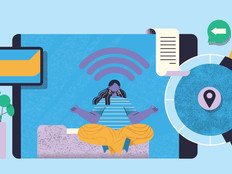4 Ways the Net Neutrality Repeal Could Impact K-12 Education
The internet fuels classroom innovation in schools across the country, but experts fear the Federal Communications Commission’s recent repeal of net neutrality rules jeopardizes that support.
While net neutrality rules were designed to ensure equal access to the internet, the December repeal effectively opens the door for internet service providers (ISPs) to disrupt access to content and charge companies to have their content prioritized.
But what does that mean for K–12 schools?
Keith Krueger, CoSN CEO, and Joseph South, ISTE chief learning officer, and other experts weighed in and shared their thoughts on the top ways the net neutrality repeal could affect K–12 education.
SIGN UP: Get more news from the EdTech newsletter in your inbox every two weeks!
1. Educational Content Slows Down, Becomes Less Available
As South explains, the end of net neutrality gives ISPs the right to decide which content they will send down the pipe faster and which content to send down slower.
“And how are they going to make these decisions? Well, those content providers who are ready to pay for fast lanes are going to move fast. And those who can’t are going to move slow,” says South.
He worries that while movies and sporting events will zip along in the fast lane, educational content such as science resources and simulations will sit in traffic in the slow lane.
2. The Cost to Connect Increases
Another concern for South is that if ISPs begin charging content providers to add their content to the fast lane, that cost could then be passed on to schools.
“The big digital publishers will pay for the faster internet. But where is that cost going to land? Well, of course, they’re going to build it into their prices,” says South. “And so, even though your digital content from those publishers may come just as fast as it used to — because they can pay — the cost to the educator and the school will go up to maintain that.”
3. The Homework Gap Will Potentially Deepen
Home connectivity is already an equity issue in schools but, as both South and Marie Bjerede, CoSN’s principal of leadership initiatives, explain, the net neutrality repeal could add to that problem if ISPs charge higher prices for faster home access.
“If there’s a decision to make regular internet access at home more expensive, some students might be in the slow lane and not able to have a good experience accessing digital resources,” says Bjerede. “Then teachers will not only not know when they assign digital homework which students have internet and which ones don’t, but which ones have high quality internet and which ones have poor quality internet.”
South says that means the quality of education provided to students from lower socioeconomic backgrounds could be “impacted disproportionately.”
4. Education Technology Innovation Could Be Reduced
Now that the net neutrality rules have been repealed, small startups with new education technology offerings may also be at a disadvantage. If they can’t pay the same fees as larger, established organizations, it could be tough for their new offerings to succeed — or even get noticed.
As South explains, “If you think about a new company, a startup — and they have some really great new idea to help educators — in order to get their product in front of educators, they may have to pay to make their service fast enough to make it compelling to educators. While the big publishers have the deep pockets to pay for that extra speed, the small ones may not.”
What Schools Can Do Today to Protect Connectivity
Net neutrality legislation is pending in several states and 22 attorneys general have sued the FCC in an attempt to reverse the ruling, according to Ars Technica. There also is discussion of a legislative solution to the net neutrality repeal in the Senate, but Krueger doesn’t see that happening anytime soon and advises schools to protect themselves now.
First, he recommends joining a statewide or regional education network because it will have more bargaining power. But, if that’s not an option, schools and districts can include language that provides net neutrality provisions in their ISP contracts.
Ron Reyer, director of technology services at Bethel Park School District, says his district is part of a regional education network, and during negotiations with ISPs, the network included net neutrality provisions in its contract.
In a recent CoSN blog post, Reyer shared that contract language for other schools to reference in their negotiations.









